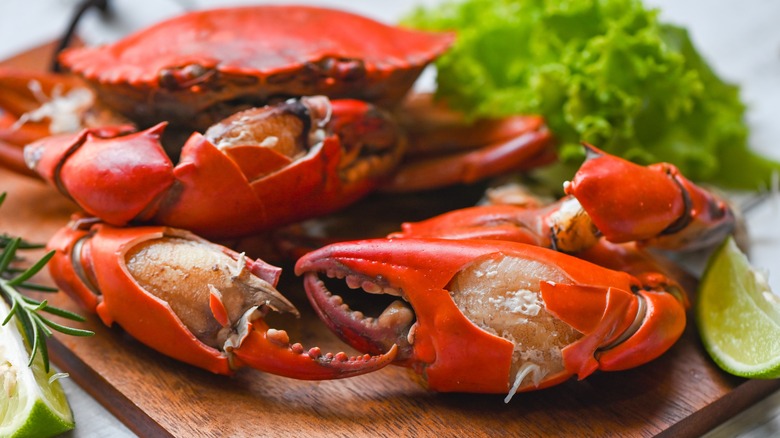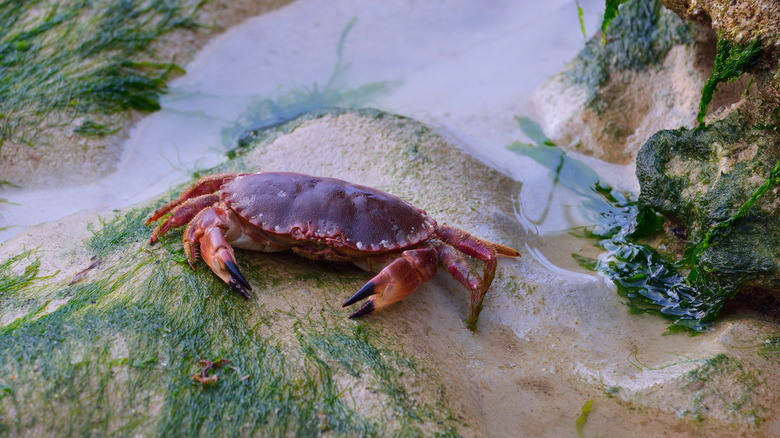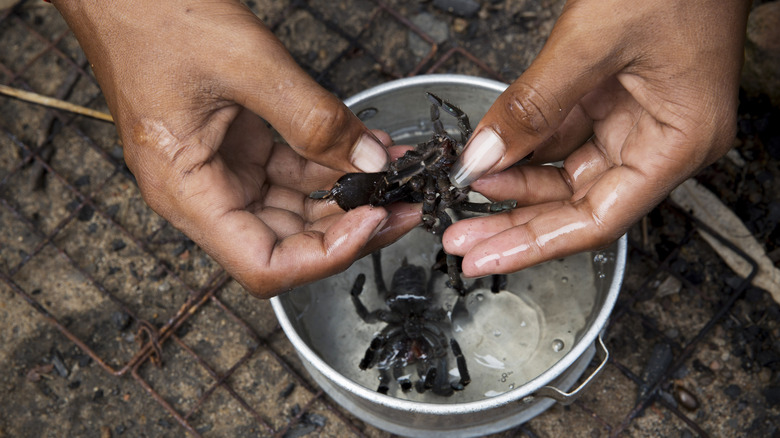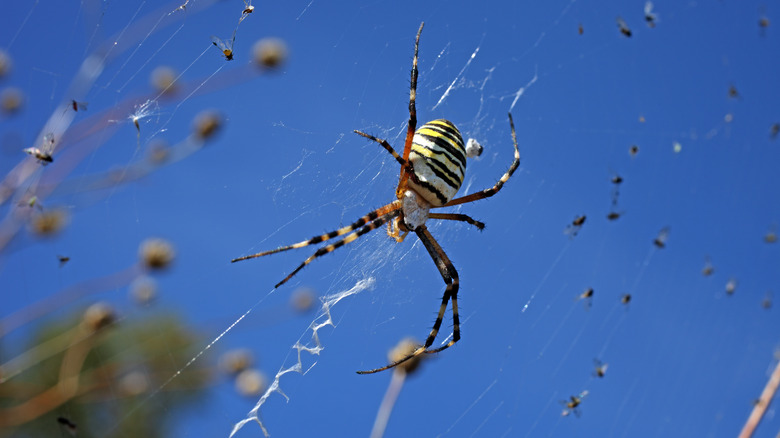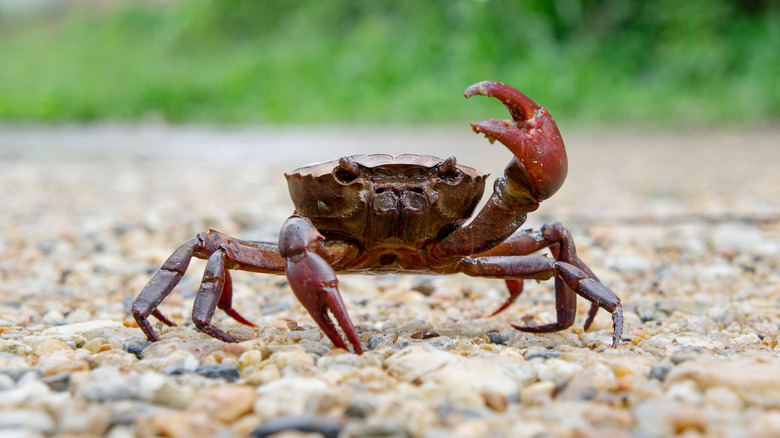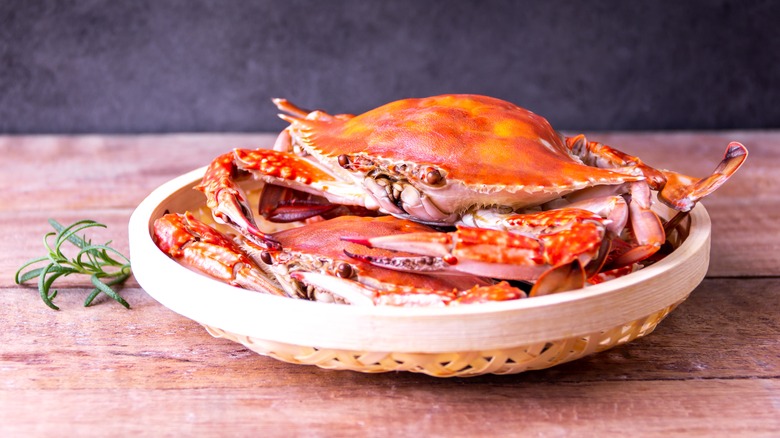Why Do We Eat Crabs While Spiders Gross Us Out?
Yes, some people enjoy eating insects and find them delicious. And true, intentionally consuming bugs is probably in all of our futures. But right now, if an eight-legged creature appeared on your dinner table, you'd more than likely react with revulsion, or at least unpleasant surprise. Unless, of course, that multi-legged creepy-crawly was a crab (maybe you'd also be cool with an octopus). But there's a bit of cognitive dissonance going on here. Why is it that so many of us can happily eat crabs and lobsters while being grossed out by spiders and other bugs?
After all, you can tell they're related just by looking at them. Technically, they're not that closely linked, although crabs and spiders are both members of the arthropod family, as are other insects, and lobsters. Basically, they're classed together because they all have exoskeletons and jointed legs. Evolution has made them all much different on the inside, and behaviorally as well, but this is a case where it's all too easy to judge a book — or a bug — by its cover.
Crawfish are nicknamed mudbugs, and lobsters are often called sea bugs too; we all know they have far too much in common for comfort, yet we generally try not to dwell on it. Even Alton Brown has likened lobsters to cockroaches of the ocean — in part to reassure those squeamish about killing live crustaceans that there's no reason to get in a moral quandary about it.
Learned behavior to eat crabs
I personally love eating crabs, and have since I was little; ditto shrimp steamed in the shell with tons of Old Bay, even though, just as house centipedes are orders of magnitude worse than spiders, shrimp, with so many more bristly little legs, should be far creepier than crabs — yet I wouldn't hesitate to rip apart a dozen of either briny creature, whiskery antennae and all. I guess I was just good at compartmentalizing from an early age because I don't recall ever being put off by any seafood (except when it came to whole soft shell crabs caught between buns, with their long legs jutting out the sides, because that is just grotesque — yet also weirdly tempting, when they're perfectly golden-brown and crisp).
Of course, there's an element of learned behavior too; I grew up watching my whole family joyfully tear into messes of often-insectile seafood on countless occasions, but I also probably saw many of them recoil at spiders and whack them with their flip-flops. I definitely saw "Arachnophobia" at way too young an age — repeatedly, because as much as it freaked me out, it fascinated me too.
Some are born with a fear of spiders
A scientific study from 2017 suggests that humans may be born with an innate fear of spiders, and there's evidence to suggest it's existed for centuries, at least. During the Middle Ages, spiders were thought to be diseased, and any food or water that came into contact with them was considered infected or poisoned (both of these examples, of course, apply only to Western societies; many other cultures around the world revere spiders, either as lucky symbols or as tasty food). Meanwhile, even as they despised arachnids, Westerners have been eating crustaceans for eons — although in certain areas, crabs were once relegated to the realm of lowly, cheap food for the poor, and lobsters were famously served to both prisoners and livestock.
Judaism deems crabs and lobsters, among other shellfish, unclean, and also prohibits conscious consumption of actual insects, including spiders (with exceptions for certain kosher locusts, grasshoppers, and worms) — and while you could assume that the dietary law was decreed due to inherent revulsion, it may also be true that this was because of common-sense hygiene concerns connected to these literal bottom feeders (and filter feeders).
Spiders are less predictable than crabs
If crabs weren't relegated to oceans (and fish tanks in restaurants and grocery stores), even those of us without kabourophobia might be a bit warier of them; part of what makes spiders so scary to many is their tendency to pop up out of nowhere — since we moved to a house, I regularly have them drop down from the ceiling right in front of my face, which only gets slightly less traumatizing every time. They can also run really fast, and often move in unpredictable directions, while crabs mainly go sideways on land, and (generally) cannot crawl up walls and dangle from ceilings.
Mercifully, crabs can't fly either, while spiders kind of can — they can launch themselves up and glide through the air, at least (this is, rather adorably, called "ballooning"), so you're basically never safe, except maybe underwater. Where you might encounter giant spider crabs, of course, with their spindly, daddy-long legs-esque appendages and bug-eyed carapace — but probably not unless you went looking for them.
Then again, there are terrestrial crabs in certain coastal areas (gigantic coconut crabs are prime nightmare fuel), but most of us don't have to worry about those. Even a mass migration of spidery, non-edible red crabs on Christmas Island, though certainly squirm-inducing, is somehow not quite as bad as an equivalent number of actual spiders would be.
Crabs are studier than spiders
They're just less skittery. Maybe it has something to do, too, with the fact that unless they're in the soft shell stage during molting, there's a greater sturdiness to crabs. They have harder exoskeletons and thicker legs, while spiders are relatively delicate and easy to squish — which, rather than making them less frightening, ups the ick factor for me. Drive over a mass of crabs and yes, you'll crush them, but they can puncture your tires at the same time. Perhaps in some way, they seem like worthier opponents?
Plus, several species of spiders are venomous, whereas no crab is going to stealth-bite you and make your tissues (and maybe your entire body) die. Crabs and other sea bugs could potentially make you sick via food poisoning, but at least that's a risk you willingly take, and have fun while doing so.
Crabs don't spin webs, either, which on their own are creepy, at least when you accidentally walk through one. And the environment in which each creature lives could also be a factor — insects are often associated with dirt (especially cockroaches, but spiders commonly hang out in dank basements and crawlspaces), while crustaceans come out of the water, which seems cleansing, despite the fact that, even discounting pollution, the ocean is full of nasty stuff, and the crustaceans themselves will eat almost anything in it, including dead and rotting matter.
The type of exposure we have to crabs and spiders
Another knee-jerk response to the question of why people who are disgusted by spiders can still love eating crabs might be to say that the crabs are dead and cooked, hence turned into food, but chances are, you wouldn't be any more thrilled about a dead-and-cooked tarantula burger than you would about a live one sidling up next to your dinner. Andrew Zimmern attests that fresh tarantula tastes "great, reminding me of sweet and delicate crabs." So why should one be so appealing, and the other so deeply horrifying?
I think the biggest factor is exposure — most of us almost never see crabs unless we're about to eat them, whereas spiders insist on scurrying into our lives regularly at the most inopportune moments. If you start watching a lot of GIFs and videos of writhing crabs, it gets uncomfortable pretty fast. And it's definitely largely cultural as well, but maybe one day, when we have no choice but to embrace insect-heavy diets, spiders will inspire more yums than "kill it with fire" hashtags — or it'll just become "cook it with fire" instead.
Until then, we'll simply keep rationalizing — or flat-out ignoring — plenty of uncomfortable truths when it comes to what we eat. Besides, when it's just about looks, if "ugly delicious" continues to be embraced, crabs are surely near the top of that heap. Or maybe we can make a new label for them and their buggy oceanic brethren. "Scary delicious" seems fitting, in more ways than one.
